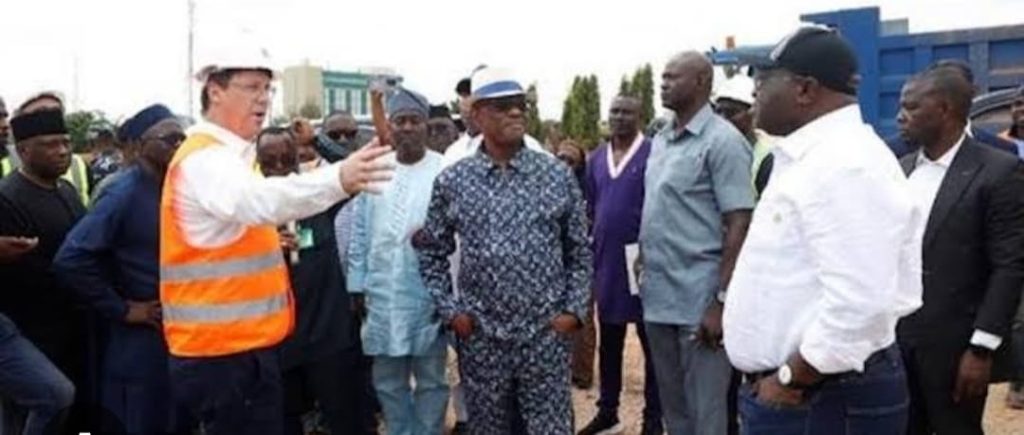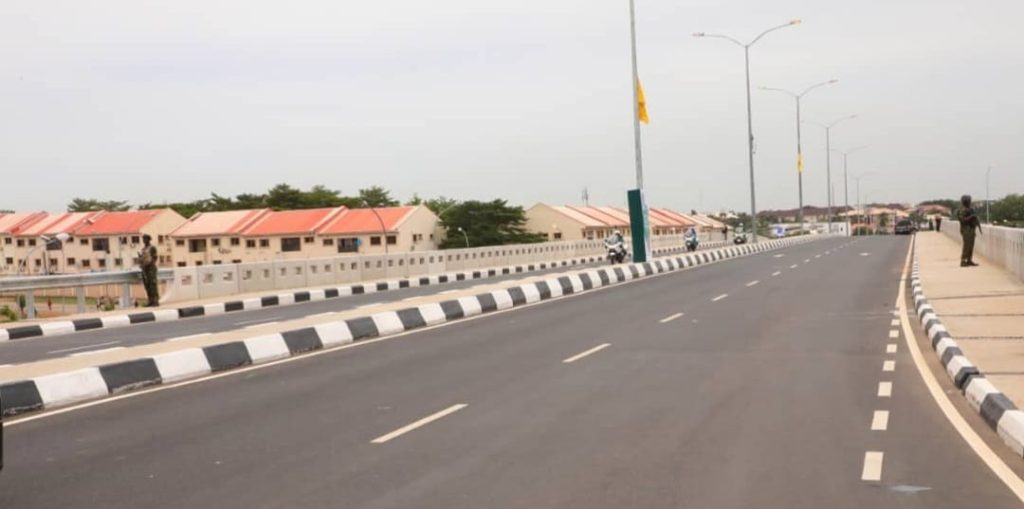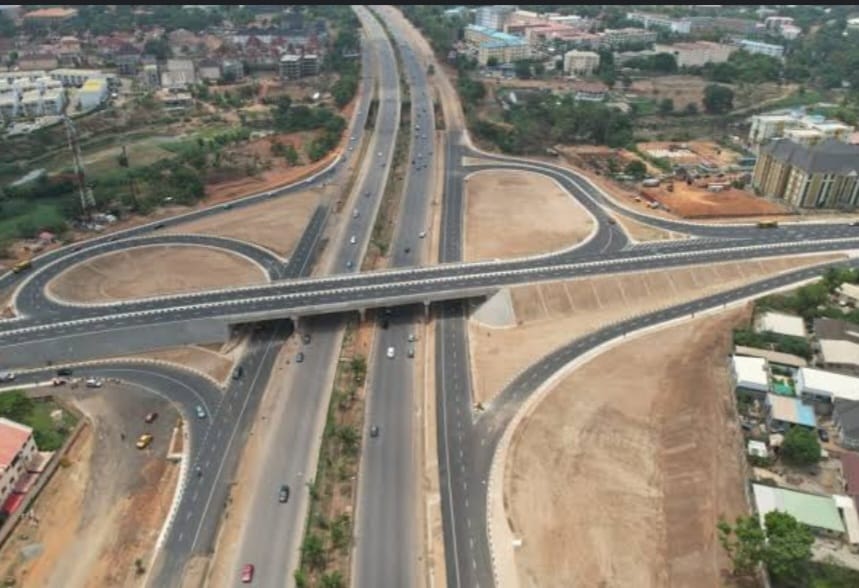There was a quiet transformation in the Federal Capital Territory, Abuja; the roads suddenly became smoother, as contractors worked day and night to remove the shame of a city, which prides itself as the nation’s capital and one of the most modernised cities in Africa.
From Garki to Asokoro, up Guzape district, down Maitama and all over the places where the Wike’s road transformation had reached looked more beautiful, free from unnecessary hold-ups, which ensured easy accessibility, as drivers enjoy seamless drive-in ceaseless traffic flow.
Minister of the Federal Capital Territory Administration, Nysome Wike, had flagged off the resurfacing of 47 roads within the City Centre, in a re-awakened commitment to maintain public infrastructure, which had been refused any touch of maintenance for so long; as the city drifted from its widely acclaimed high aesthetic values, into the ugly sides.

The city had also lost its glorious safety days to the invasion of hoodlums and became a den of kidnappers, armed robbers, drug peddlers and other criminal elements. Restoring the Federal Capital back to its glorious safety days became another frontier for Wike’s transformation. He took the battle to the criminal elements in uncompleted buildings, unutilised spaces, green areas, under the bridges and wherever they could be found.
What followed was demolition of abandoned structures, which constituted security threats to neighbours and the general public, especially, in highbrow areas of Asokoro and Maitama; as well as, other parts of the city including Utako, Garki among others hosting slums where criminal elements had freely lived and served as take-off points for their criminal activities.
The Minister demonstrated he needed the participation of the people, when he became the first Minister of the Federal Capital Territory to take governance to the people in their domain; he went round each of the local government area council to hold town hall meeting with the people; to appreciate their problems, as well as, win their support. For many of those who attended the meetings, it was the first time they would see an FCT Minister in flesh and blood, seated in their midst and communicating directly with them in a highly interactive session, which suggested the character of a leader who does not use power as a giant.

The impact of this was not lost on the people, as it gave them hope for better quality life. This was because many of the rural communities in the FCT lived without cl
earn source of drinking water, lacked motor able access roads to their communities, where there was perpetual darkness for lack of electricity, where children trekked long distances to go to school and access to health care was a luxury; among other infrastructure that were lacking to give them a good sense of belonging.
The ambition of the Minister was to make a difference; his target being to build a catalogue of achievements that would make President Bola Ahmed Tinubu proud at his first one year in office.
When President Bola Ahmed Tinubu, nominated the former Governor of Rivers State for confirmation by the Senate, and deployed him as Minister of the Federal Capital Territory, tongues went wagging among different publics across sections of FCT residents.
Many thought it was a well-deserved nomination, citing his record of performance as Governor of Rivers State. Besides, some looked at the cosmopolitan composition of the FCT, and came to the conclusion that Wike’s cosmopolitan background as former Governor of a cosmopolitan state, was a healthy development for the FCT; and that it would break the jinx in which previous FCT Ministers had always come from states of
the North.

Others considered his temperament as Governor of Rivers State; and concluded that the FCT Administration, was going to return to the days of Malam Nasir elRufai, when the drive to maintain the Abuja Master plan, led to massive demolition of houses and shanties across the FCT; and left many families in agonies of homelessness. This was because it was observed that since the days of Nasir elRufai, the FCT went into decay of environmental abuses.
In all these, the question that was waiting for an answer was: what Nyesom Wike was going to do to sanitise the FCT? The answer came very quickly, when upon assumption of office, he declared that he would move against all structures, which distorted the Abuja Master plan; as well as, demolish shanties to dislodge criminal elements. His tone in that declaration sent panic into the minds of many residents, who could be victims because of their living or business locations.
But there were several other issues, confronting the Federal Capital Territory Administration. One of them, which came into focus at a media chat with journalists, was how to generate internal revenue to meet demands of the administration’s drive. He found out, upon assumption of office that the FCT only collected one per cent of what was allocated to the Federal Government, instead of one percent of the entire Federation Account; while about N8.9 billion was required monthly, to pay salary bill of workers; which must be generated from Internally Generated Revenue (IGR,) every month.
He realised that the only way out, was to intensify IGR generation by looking inwards to those areas where the administration was losing revenue and to block all leakages. One loose end he found out was in the area of Certificate of Occupancy (C of O,) for which a Taskforce had proposed N5 million for mass housing estates.
When stakeholders kicked, Wike made history as the first FCTA Minister to hold an interactive session with the private estate developers, those who bought houses from them, and other stakeholders. The problem was that there was one C of O per estate, even when the houses were over 500 units; this was against the interest of other stakeholders, like those who have bought houses from the developers and wished to have their individual C of Os.
At the interactive session, the private developers wanted a reduction of the N5 million fee for C of Os for mass housing; Wike resolved to reduce the cost of C of Os to N3.5 million for those in mass housing units, and libralised the administration of the C of Os, so that individual home owners in the estates could have their C of Os.

To further boost the FCT IGR, Wike obtained a presidential approval to go after multiple property owners, who had been evading taxes in the FCT. This was because he found out that there were a lot of discrepancies and claims, and came up with the idea that every allottee who sought and applied for C of Os, will supply his NIN as one of the features of a new C of Os to be issued to individual land owners in the FCT; while corporate bodies will supply the BVN of their companies. The purpose was for easy identification of land owners; both for security reasons and for revenue generation, to boost the IGR of the FCT.
Wike’s target was against the rich and the powerful, living above the law in the FCT; some, he found out, owned up to seven properties but had not paid ground rents for up to 15 years or 20 years, since they were given Rights of Occupancy and C of Os. He threatened to revoke these Rights of Occupancy and C of Os, if the allottees failed to pay.
This posture sent a warming finger to the debtor land owners, many of whom, had survived previous administrations unchallenged; this time around Wike took the challenge to their door steps. The response was that they scampered to the FCT revenue offices to pay; and within a few months, the FCT revenue base rose from between N12 billion to N14 billion monthly; to about N100 billion, and it was still counting as more money from debtor property owners were raked-in.
Wike’s determination was to make changes in the FCT, regardless of those who may not desire change; because as far as he was concerned, the land belonged to the government, which also provided the infrastructure and allocated to mass housing owners, who built and sold at exorbitant prices; but paid nothing back to the government.
Like the proverbial “bull in a Chinese shop” Wike burst the cartels at the legal secretariat, of the FCTA. They were Civil Servants, who were employed because of their legal background to guide and defend the FCTA on legal matters. But Wike found out that they could no longer be relied upon to defend the Administration. He said consequently, “I inherited several court judgements against the FCT, because the legal secretariat failed to do its job; some of them instigated some of the land suits…” The change that Wike brought on board was to assemble about 24 Senior Advocates to defend the FCT on land matters, confident that nobody would compromise them.
Wike’s performance race was targeted at May 29 2024, when President Bola Ahmed Tinubu would celebrate his first one year in office. His wish was to complete a number of projects in favour of the President’s record of performance. He promised to work to deliver on the completion of the abandoned Vice President’s official residence, since 2010; he also promised to complete road B6, road B12, the four lane Villa Road, including an aspiration for President Bola Ahmed Tinubu to ride on the Abuja Metro line, on May 29 2024.